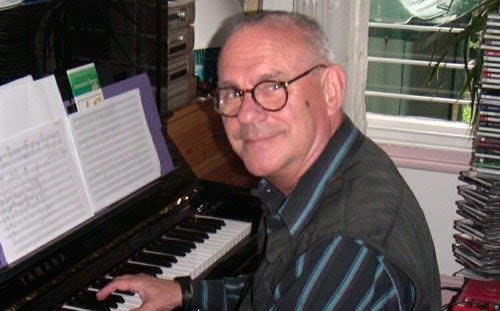John White, maverick composer who turned gently absurd sounds into minimalist ‘systems music’ – obituary

John White, who has died aged 87, was an accomplished pianist and a maverick composer who wrote at least 180 piano sonatas, 25 symphonies and 30 ballets; he is credited with creating “systems music”, a British form of minimalism in which a work evolves gradually over a long period of time, often with computer assistance.
In the mainstream musical world White composed scores for Simon Callow’s adaptation of Les Enfants du Paradis at the Royal Shakespeare Company and was music director for several West End shows including Canterbury Tales and Hair. He also spent more than 40 years as head of music at London Drama Centre, serving as guru to several generations of young composers.
At first few of his mostly single-movement piano sonatas were heard in public. Rather, they represented a diary that the composer started in 1956, recording his musical obsessions of the moment. Gradually they became better known and in 2006 some 48 of them, ranging in style from Schumann and Busoni to Medtner and Messiaen, were heard in a six-hour, nine-pianist marathon at Wilton’s Music Hall in London.
White’s stubborn individuality and gentle absurdism made him one of the most original voices in 20th-century British music. The Radio 3 presenter Sarah Walker, who performed in a duo with him, told how “he could even turn an electronic fake dog bark into the most engaging and wonderful music.”
In May 1968 White played the tuba and Cornelius Cardew the cello in the premiere of White’s Cello and Tuba Machine, a work that can last up to five hours and is considered to be a direct antecedent to Brian Eno’s Music for Airports. Not everyone was impressed, with the critic Max Harrison writing after a 1971 performance: “White’s music is without a past and, one suspects, with little future.”
Another minimalist work was Drinking and Hooting Machine (1978) in which four groups of performers drink a bottle of beer and alternate between gulps and blowing into the bottle’s mouth, generating a kind of chorus of mournful owls. He also composed Newspaper Reading Machine (1971) in which at least five performers read the same article eight times at their own pace, emphasising different words or punctuation (articulated as “tic”) on each reading.
More recently White’s Chord-Breaking Machine was performed at the 2013 BBC Proms by the BBC Scottish Symphony Orchestra and Ilan Volkov. Ivan Hewett described it in The Daily Telegraph as “a fascinating procession of undulating two-note patterns, each of which blended imperceptibly with the next, the area of doubt marked with amusing punctiliousness by brass chords”.
John White was born to an English father and a German mother in Berlin on April 5 1936. He arrived in London in 1939 and by the age of four was taking theory lessons with Hélène Gripps, who had been a student of Johannes Brahms.
At St Paul’s School, London, he studied with a “mad Welshman who lit the place up musically”. Yet he eschewed competitions and exams, instead pursuing music for its own sake. He took piano lessons with Arthur Alexander, who was also later his teacher at the Royal College of Music where he claimed to have been the first student to perform works by Satie, Schoenberg and Messiaen in a chamber concert.
Before that White had been intent on pursuing art and sculpture. His first job was in the window display department of Harrods, where during lunch hours he ventured into the piano department, startling shoppers with his rendition of music by Milhaud, Schoenberg and Hindemith.
There he met Malcolm Williamson, an Australian émigré and the future Master of the Queen’s Music, who was working in the boys’ underwear department. Williamson introduced him to the leading lights of British contemporary music including Alan Rawsthorne and Elisabeth Lutyens. “I just really wanted know more about this weird music that my parents disapproved of,” White said.
In 1956 he heard Messiaen’s Turangalila Symphony, Weill’s Seven Deadly Sins and Bernstein’s West Side Story. That same year he wrote the first of his many piano sonatas, which was performed by Colin Kingsley with Cardew in the audience. He went on to teach at the Royal College of Music, the Yehudi Menuhin School and the London Drama Centre. In 1995 he was the featured composer in the annual Park Lane Group concert series at the Purcell Room.
Life was not without its upheavals. In 1998 White told the Radio 4 documentary Here Today, Gone Tomorrow, how with the loss of his extensive CD collection in a burglary he came to understand its sentimental significance. “I’ve had to find some way of coping with a whole part of my life that has disappeared,” he said. “It’s rather like suddenly finding that part of one’s memory has gone.”
White’s first two marriages were dissolved. In 2003 he married Margaret Coldiron, a theatre director and academic, who survives him.
John White, born April 5 1936, died January 4 2024

 Yahoo News
Yahoo News 